| |
 
Summer Sale Double Deal! (Scroll down for full newsletter or follow the links):
Ask Heather »
Your brain? Your gut? What an IBS attack literally looks like.
IBS Recipe »
World's best, easiest, and IBS-safest guacamole!
Research & News »
Do you talk about your IBS? Does it matter?
Special Letter »
No longer passing out from pain, and she's never looked back!
Hello to everyone ~
We're continuing our special July sale that is exclusive to the IBS newsletter, as a thank you to our regular readers and customers!
We're offering a special 10% discount code through this newsletter only, good through the end of July. If you use this promo code, which can be applied to any order whatsoever, you'll automatically receive a second 10% discount code for your next purchase. The second code will be good until the end of August.
**Simply click through here to add items to your cart and get your discount code automatically after you confirm your shipping information upon check out! (This link is the only way to get your special discount.)**
If you prefer to shop at a local store, and have already taken advantage of our 50% rebate for first-time local purchases, we'll refund 10% of the purchase price of any Heather's Tummy Care products bought locally during July or August. Simply send us your receipt (Heather's Tummy Care, 80 S. Washington St. Suite 304, Seattle, WA, 98104) and we'll send you your rebate.
If you haven't yet purchased from a local store, for your first purchase locally we'll refund 50% of your purchase price - up to a $50 rebate! Just send us your receipt (Heather's Tummy Care, 80 S. Washington St. Suite 304, Seattle, WA, 98104) and we'll send you your rebate.
Whether online or at local stores, we continuously strive to offer the highest possible quality products (certified organic, high volatile oil, prebiotic, jumbo tea bags, and more) at the lowest prices. Plus, everything has a 100% money-back guarantee!
Best Wishes,
Heather Van Vorous
Did a friend send you this newsletter? Sign up here for your own free subscription.
~ Heather's Tummy Tamers Peppermint Oil Capsules ~

Peppermint Oil Caps Called "Drug of Choice for IBS"
Our Peppermint Oil Caps have the added benefits of fennel and ginger oils, and they help prevent abdominal pain, gas, and bloating!

World's Best Guacamole! This recipe is so easy it doesn't even require measurements. It's also a great example of how some foods that are often thought of as triggers aren't necessarily so.
Avocados are sometimes avoided by people with IBS because they're considered to be high in fat. Actually, they're just high in fat for a fruit (most fruits are fat-free). One large avocado typically has only 100 calories from fat, which is about one tablespoon. Plus, one large avocado makes enough guacamole for several people to share, so each person is only getting about one teaspoon of fat per serving. In addition, the fats are monounsaturated and heart-healthy.
It's also important to note that the green Tabasco sauce in this recipe is quite mild. All peppers contain capsicain if they're "hot", but the peppers in green Tabasco (as opposed to the traditional red version) have very little capsicain. You can easily use green Tabasco sauce to add delicious zest to this guacamole without adding much (if any) heat.
Finally, the Tummy Fiber adds digestive stability (and a wonderful creamy texture) to the recipe. Avocados already contain soluble fiber, so this step just takes the recipe from digestion-friendly to downright beneficial. If you're just starting out with Tummy Fiber, add only about 1/2 tsp to the recipe. If you're a regular user, you can add up to one tablespoon.
Makes 2-3 Servings (easily doubled or tripled)
1 large ripe avocado, peeled and pitted
Green Tabasco sauce to taste
Acacia Tummy Fiber to taste
Mash all ingredients together in a bowl with a fork until well-blended. Serve with baked corn chips and enjoy!
For a delicious summer treat, serve the guac and chips with an iced glass of lightly sweetened Peppermint Tummy Tea!
Are you just learning how to eat for IBS? A little intimidated at the thought of special IBS recipes? Not quite sure just what makes these recipes special in the first place? Don't worry! Come see the IBS Diet pages, and find the answers to all your questions.
  
Organic High Volatile Oil Fennel & Peppermint Tummy Tea Bags
Extraordinary Quality ~ Very Economical
Fennel is terrific for bloating & gas, Peppermint is great for IBS pain & spasms.
Heather's Fennel Tummy Tea Heather's Peppermint Tummy Tea
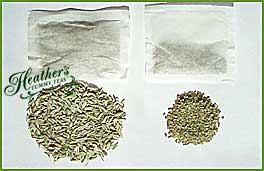  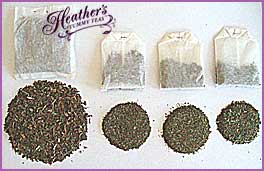
Compare for yourself! The pictures above show the huge difference in the quantity and quality of tea per teabag. The price comparison here is even more shocking!
 Symptoms Gone and She's Never Looked Back!
Symptoms Gone and She's Never Looked Back!
Hi everyone,
I'm new to this site and I just have to share with people on here who suffer with IBS. I have suffered with it for over a year now and had tried everything from tea to prescribed medication from my doctor. Nothing seemed to work for me. I changed my diet completely and it helped but I was still getting flare ups of the IBS (it is diarrhea predominant).
I sometimes used to pass out with the pain that I got from it. It got to the point that I was scared to eat anything, so ended up losing quite a bit of weight (which I needed to do anyway, but I wouldn't recommend this type of diet to people).
I was trawling the internet and stumbled across Heather Van Vorous's website and found her to be marvelous in her management of IBS. She has suffered from this horrible syndrome from a very early age and because of not getting any satisfaction from doctors she decided to take actions into her own hands and start the website. Anyone who suffers from IBS should go to her website and read about her and the many different things that she has for relieving the symptoms of IBS.
Through this website I also came across the hypnosis CDs by Mike Mahoney. What a wonderful thing I have found, this is a 100 day programme for IBS suffers and I swear to you I have never looked back.
My symptoms have literally gone! If I have a flare up it is gone within a matter of two hours. This man is amazing and I would recommend this hypnotherapy CD to all IBS sufferers.
If you have not already done so then please try hypnotherapy!
Carole
United Kingdom
Thanks Carole! I'm so happy you're doing better. The hypnotherapy program is indeed wonderful! ~ Heather
Did you miss the recent letter from Janice, who has something superior for IBS?
Researchers call gut-directed hypnotherapy a "cure" for IBS!
The Best Gut-Directed Self-Hypnosis Program for All IBS Symptoms
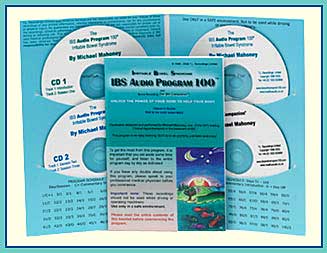 
Gives an average 85% reduction of pain and bowel dysfunction symptoms.
Listen to IBS Audio Program 100 samples!
 IBS - Do You Avoid Talking About It?
IBS - Do You Avoid Talking About It?
Dr. Jennifer L. Bevan, at Chapman University, recently published a study on IBS and interpersonal communication, based in part on participation and feedback from members of the IBS Newsletter and HelpForIBS.com.
Through the lens of the theory of inhibition and confrontation, this study explored the relationships that interpersonal communication apprehension and topic avoidance in one's closest relationship share with the experience of irritable bowel syndrome (IBS).
Specifically, an online survey that studied U.S. IBS-diagnosed and non-IBS subsamples examined person–partner communication apprehension, amount of overall topic avoidance, and reasons for topic avoidance in relation to four IBS experience variables.
Communication apprehension displayed a particularly strong relationship with multiple aspects of the IBS experience, and a number of the communication avoidance variables varied according to IBS diagnosis. Implications for the theoretical understanding of interpersonal communication processes in the specific context of IBS and general chronic health conditions are discussed.
Go here to read the full article.
~ Heather's Tummy Fiber ~
For the Dietary Management of Abdominal Pain, Diarrhea, &, Constipation
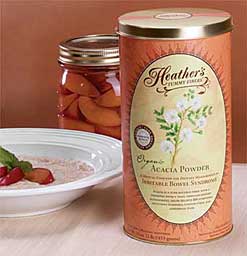
Certified Organic Acacia ~ Pure Soluble Fiber
The prebiotic fiber that relieves both diarrhea and constipation!
** Very Economical ** Only 5 cents per gram of fiber!
 A Brain-Gut Disorder - What an IBS Attack Literally Looks Like A Brain-Gut Disorder - What an IBS Attack Literally Looks Like
Irritable Bowel Syndrome, as defined by the Rome Criteria diagnostic guidelines, is characterized as a brain-gut dysfunction. What on earth does this mean?
In plain English, it means that IBS symptoms result from a hypersensitivity of the nervous system of the gut, along with misinterpretations of the nervous system messages from the gut by the central nervous system and the brain.
Basically, this circuit (from gut to brain and brain to gut) appears to be abnormal in patients with Irritable Bowel Syndrome, though the exact abnormalities remain unclear.
Remarkably, PET scans of the brains of people with IBS show pronounced differences in the activation of certain parts of the brain relating to perception and pain (versus normal individuals). MRI brain scans have shown similar results.
This means that IBS is indisputably a physical problem. Simply put, the brain-gut interaction of people with IBS influences their bowel pain perception and motility. In a nutshell, the processing of pain information within the central nervous system varies between normal individuals and those of us with IBS, with the result that we can experience even normal GI contractions as painful.
The interactions between our brains, central nervous systems, and GI systems are just not functioning properly. We have colons that react to stimuli that do not affect normal colons, and our reactions are much more severe.
The end result is heightened pain sensitivity and abnormal gut motility, in the form of irregular or increased GI muscle contractions. It is this gut overreaction and altered pain perception that cause the lower abdominal cramping and accompanying diarrhea and/or constipation that characterize IBS.
However, while the underlying problem might well be in our brains, there is still a physical abnormality in the way our colons function. This dysfunction is actually visible (shockingly so) in the medical imaging tests below.
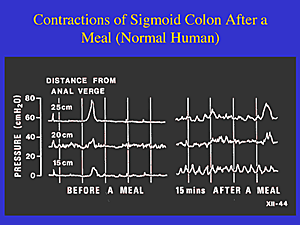
This is a normal gut 15 minutes after a meal.
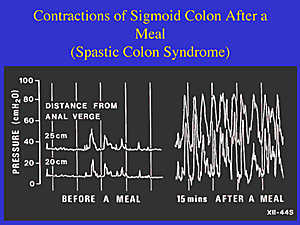
This is an IBS gut 15 minutes after a meal. Holy cow!
Illustration from Irritable Bowel Syndrome (IBS): Examining New Findings and Treatments. Authors: Marvin M. Schuster, MD; Michael D. Crowell, PhD; Nicholas J. Talley, MD, PhD. Continuing Medical Education Activity, Johns Hopkins School of Medicine, October 26, 2000, via Medscape. Used with permission.
Typically, the majority of the time the colon is still. However, following a meal, the stomach triggers something called the "gastrocolic reflex." This response occurs when food passes from the stomach into the upper part of the small intestine.
Normally, the gastrocolic reflex causes periodic contractions of the colon at different points along its length, at timed intervals. These segmented contractions regulate the flow of waste, and keep it in contact with the bowel wall, allowing water to be absorbed.
Finally, peristaltic contractions of the colon propel the waste to the rectum and then out of the anus via evacuation by a bowel movement. Total average transit time through the entire 30-foot digestive system, from mouth to anus, is between 12-24 hours for healthy individuals with high-fiber diets, and 48-72 hours for most Americans eating a typical Western (high fat/animal protein, low fiber) diet.
Where Things Go Wrong...
Unfortunately, how the digestive tract is supposed to work is not exactly how it does work for those of us with IBS. The key problem seems to be with the gastrocolic reflex. Specifically, research has found that many IBS patients have highly abnormal ones.
Our colons have disorganized and significantly more violent and prolonged contractions (leading to diarrhea), or almost no contractions at all (resulting in constipation).
Amazingly, researchers have found that while healthy people have between 6-8 peristaltic contractions in their colon within a 24-hour period, IBS sufferers with diarrhea have as many as 25 peristaltic contractions per day, and constipation-prone IBS patients have almost none.
Add to this bowel dysfunction the heightened pain perception resulting from our abnormal brain-gut interactions, and you've got the recipe for disaster...spelled I-B-S.
There's vivid demonstration of this in the images above. They show the huge difference between the after-meal contractions of a normal person's lower (sigmoid) colon and the contractions of the lower (sigmoid) colon in a person with IBS. The left half of both illustrations shows the colon contractions before a meal, and the rates are very similar and quite modest.
Just fifteen minutes after eating, however, the differences in colon contractions as shown on the right sides of the graphics are dramatic. Given the almost off-the-chart severity of the spasms (measured by the vertical axis in terms of pressure) in the IBS patient, it's easy to literally see exactly why the pain and bowel dysfunctions of this disorder can be so extreme.
As you read these graphics, don't be intimidated by the "distance from anal verge"legend for the horizontal axis of the chart. All that term basically means is how far up into the colon from the anus the contractions are being measured (they're either 15, 20, or 25 centimeters up into the colon from the outside of the anus).
In other words, the contractions triggered by the gastrocolic reflex from the stomach are affecting the very lower end of the colon just fifteen minutes after a meal has been eaten. This gives a crystal clear explanation for how an attack can hit you so fast and so hard after - or even while - eating.
Personally, I can't look at these charts without having flashbacks to all the times I've had to rush from the dinner table before I'd even finished my meal. The worst memory of all is from a vacation in Hawaii when I was twelve, and had been allowed to order a whole lobster for myself.
Unfortunately, a virgin pina colada (in hindsight, it was the high-fat coconut milk on an empty stomach that did me in) triggered an attack before my meal had even arrived at the table. I spent the entire evening doubled over in agony in a bright pink hotel ladies lounge while my family ate my lobster.
It's not much consolation to finally get a scientific explanation for exactly what happened to me that night, but I suppose it's nice to no longer be completely in the dark. (And in case you're wondering, I haven't had a pina colada since.)
No one really yet knows exactly why some people develop the brain-gut dysfunction of IBS and others don't. There is mounting evidence that for some IBS sufferers the condition is precipitated by some type of grievous insult to the gut - dysentery, food poisoning, intestinal flu, abdominal surgery, even pregnancy. The theory goes that even after full physical recovery from these traumatic events, the nerves within the gut retain a "memory" of the insult and remain hyper-sensitive to further stimulation, as well as prone to subsequent over-reaction.
You likely know if you experienced any abdominal trauma immediately prior to the onset of your IBS symptoms, and if you did it's probably nice to have a logical explanation for what has happened to your GI tract and why. There are those of us who are exceptions to this theory, however, who suffered no gut insult prior to the onset of IBS symptoms, and we're still patiently waiting for our explanation.
So now that you know it's a brain-gut connection that's going wrong with your body, what can you do about it?
My top recommendation is gut-directed hypnotherapy. It's one of the most promising methods of treating IBS permanently (researchers have actually called it a cure!), and it deals specifically with the brain-gut dysfunction.
To manage symptoms on a daily basis, a prebiotic soluble fiber supplement can help regulate the gastrocolic reflex, and keep peristalsis normal. This can prevent abdominal spasms and cramps, and relieve both diarrhea and constipation.
To learn more about the brain-gut dysfunction and Irritable Bowel Syndrome overall, check the The First Year: IBS, an essential guide to successfully managing the disorder.
Finally, there are numerous published medical studies on the IBS brain-gut dysfunction in the IBS Research Library.
~ Heather
Did you miss our recent "Ask Heather" and fiber supplements - why bother?!

Shop at Heather's Tummy Store for IBS
HelpForIBS.com
The only store that's just for IBS - so we only carry the very best

You're on this newsletter list because you have expressed interest in IBS news and information.
Change your newsletter email address here.
If you are viewing this newsletter on a website and would like to subscribe for email delivery, please "Join the IBS Newsletter" here.
ANTI-SPAM PRIVACY & SECURITY POLICY
HelpForIBS.com
Heather's Tummy Care
80 S. Washington St, #304
Seattle, WA 98104 USA
© 2009 Heather Van Vorous, Heather's Tummy Care. All rights reserved.
USA Copyright Office Registration Number TXU 1-270-858 and others
|
|
|